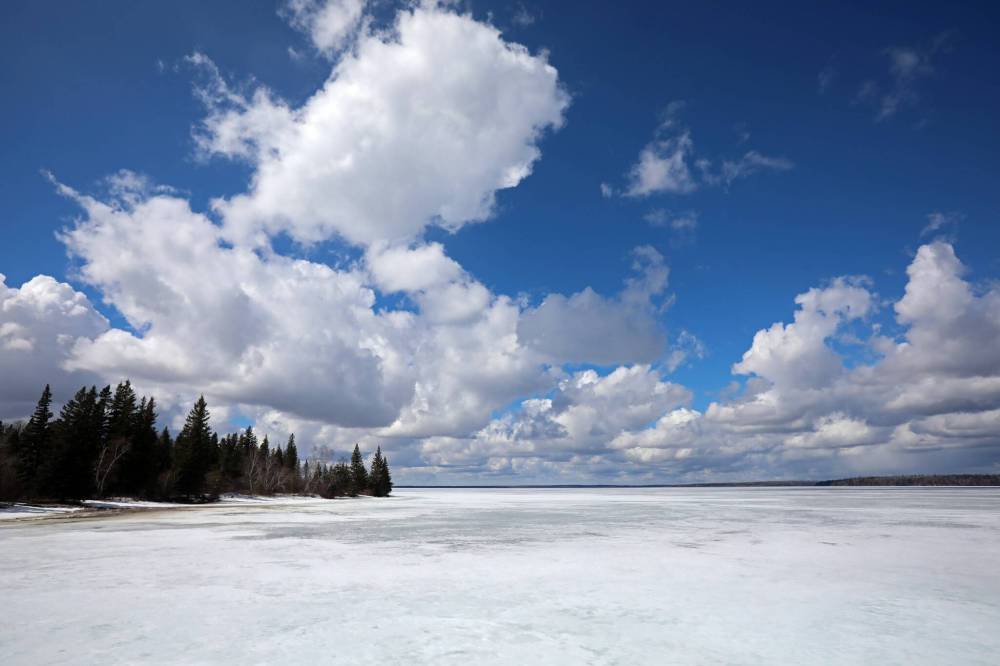Riding Mountain community grapples with potential boat ban
Advertisement
Read this article for free:
or
Already have an account? Log in here »
To continue reading, please subscribe:
Monthly Digital Subscription
$19 $0 for the first 4 weeks*
- Enjoy unlimited reading on winnipegfreepress.com
- Read the E-Edition, our digital replica newspaper
- Access News Break, our award-winning app
- Play interactive puzzles
*No charge for 4 weeks then billed as $19 every four weeks (new subscribers and qualified returning subscribers only). Cancel anytime.
Read unlimited articles for free today:
or
Already have an account? Log in here »
BRANDON — Members of the Riding Mountain community are divided on Parks Canada’s communication strategy about the potential closure of Clear Lake due to invasive zebra mussels.
Ian Drul, reeve of the Municipality of Harrison Park, defended the federal agency’s approach.
“Since the live zebra muscles clump was found in boat cove in November, Parks Canada have held multiple in-person and virtual public meetings to discuss what should happen with the lake,” Drul said in a statement Friday. “Parks Canada staff at Clear Lake have been an open book.”

Ice still covers Clear Lake in Riding Mountain National Park on a mild Thursday. Parks Canada has not yet announced an official decision regarding the use of the lake, but the province is concerned that it will be closed to boating this season because of zebra mussels. (Tim Smith/The Brandon Sun)
Other community members say they have been left in the dark.
Ashley Smith, an Indigenous business owner in the Clear Lake area, is frustrated about the lack of consultation with all seven nations associated with the Coalition of First Nations with Interests in Riding Mountain National Park.
“That’s the scary part for us — we’re always being told what’s best for us, but nobody’s hearing our voices, and the consultation has seriously been lacking with the First Nation people,” she said.
Smith said her businesses have had cancellations and fewer reservations so far this year.
“It’s not a question of if Parks Canada’s decisions will hit us, but how hard,” Smith said in a letter to the Brandon Sun.
Aaron McKay of Rolling River First Nation, 24 kilometres south of the park, who is running for a seat on his First Nation’s council, told the Sun the issue of the health of Clear Lake shouldn’t be looked at through a lens of profitability.
“I don’t see money. What I see is the spirit of that lake, and I see a sickness. I see a living being that is sick, and that living being, that piece of creation that is inside all of us, needs help,” he said.
Any decision about Clear Lake, including how to handle zebra mussels or other invasive species, must consider the future effects.
“We’ve got to be thinking at least 100 years down the line.”
Before Manitoba elected the NDP government in October, Trevor Maguire, chairperson of the Pelican Lake healthy lake committee, was named to the province’s aquatic invasive species committee.
Since the NDP took over, the provincial committee has held meetings and a plan to protect Clear Lake and other Manitoba lakes from zebra mussels and other aquatic invasive species is in place, although Maguire said he couldn’t share specifics.
“They took written submissions from all the (committee) members and they put together a plan. From what I’ve seen of it, it looks good.”
Maguire was also pleased there was an additional $500,000 for the aquatic invasive species program to beef up watercraft inspection and decontamination stations.
While such steps are in the right direction, stringent rules like the ones Parks Canada set in motion last year, such as tagging boats, are the only way to ensure the future health of the Clear Lake.
Banning boats would be a reliable method to tamp down the zebra mussel population, Maguire said.
“It is the only way to stop the spread,” he said.
With any luck, rules that are just as strict or even stricter, if Parks Canada enforces them, will help Clear Lake bounce back from its current state, Maguire said.
It’s not too late for the lake, which is known for being cold — something zebra mussels don’t like — plus its lack of turbidity and calcium, he said.
However, if the public doesn’t abide by those rules, the problem will never be solved, he added.
“Of all the first world problems that we have to deal with, how terrible is it that we can’t move our expensive boats from lake to lake, and we have to pick one for the summer?” Maguire said. “It doesn’t sound like it’s that much of a hardship.”
If people can’t abide by whatever rules Parks Canada sets out, or if the rules aren’t strong enough, it won’t just be Clear Lake that’s at risk, but many lakes and other bodies of water in the area, Maguire said.
“The water is going to flow downstream, so eventually, everyone downstream from them is going to get infected,” he said.
All parties seem to agree collaboration about the lake is key.
“The federal, provincial and municipal governments all need to work together to make a plan for the region,” said Drul.
— Brandon Sun


